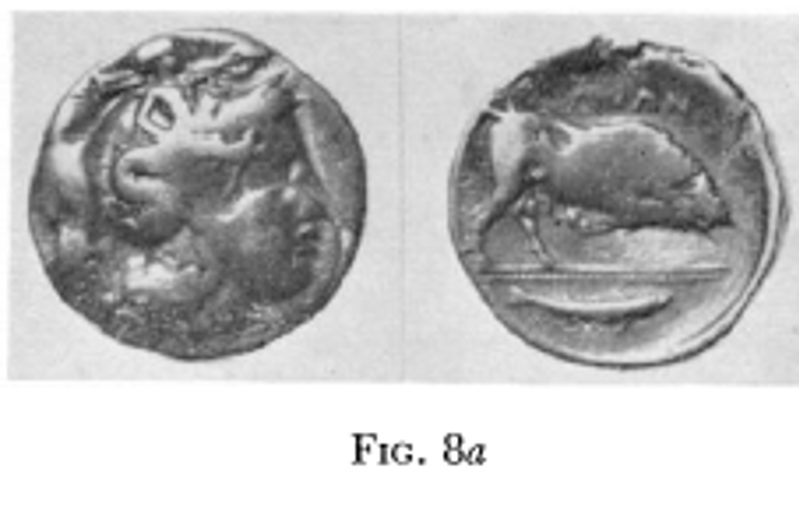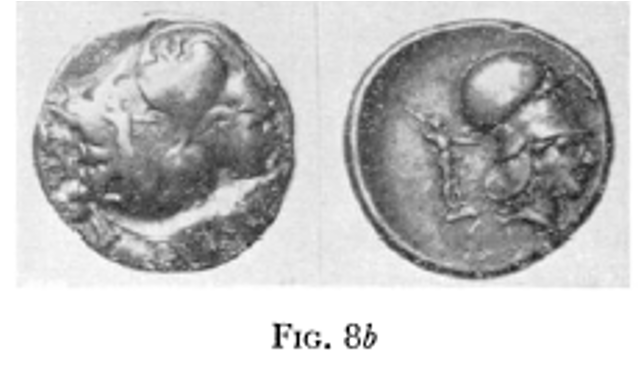|
|
| Line 28: |
Line 28: |
| |Coin series web reference overstruck=https://greekcoinage.org/iris/id/corinth.calciati.1990.period_iv.period_1-17 | | |Coin series web reference overstruck=https://greekcoinage.org/iris/id/corinth.calciati.1990.period_iv.period_1-17 |
| |Frequency of overstrikes=rare and spread | | |Frequency of overstrikes=rare and spread |
| | |Level of confidence=sure |
| }} | | }} |
Latest revision as of 23:11, 27 December 2023
400 BCE - 350 BCE | ΘΟΥΡΙΩΝ
Overstriking coin
SO 1312 - Thurium over Corinth.png
Overstruck variety
1312 Corinth variety.png
Description
| ObverseInscription or printing placed on the obverse.:
|
Head of Athena right, wearing crested Attic helmet decorated with Skylla holding rudder-oar over shoulder.
|
ReverseInscription or printing placed on the reverse.:
|
ΘΟΥΡΙΩΝ (Greek) Bull charging right. In exergue, fish right.
|
Mint and issuing power
| MintIdentifies the place of manufacture or issue of a numismatic object.:
|
Thurium
|
Ancient regionAncient region.
|
Lucania
|
Modern countryModern country: Italy
|
AuthorityIdentifies the issuing power. The authority can be "pretended" when the name or the portrait of X is on the coin but he/she was not the issuing power. It can also be "uncertain" when there is no mention of X on the coin but he/she was the issuing power according to the historical sources:
|
|
Chronology
| FromIdentifies the initial date in a range assigned in a numismatic context. 400 BCE toIdentifies the final date in a range assigned in a numismatic context.. 350 BCE
|
Classical 480-323 BC  periodTime period of the numismatic object. periodTime period of the numismatic object.
|
Physical description
MetalThe physical material (usually metal) from which an object is made.: Silver 
|
WeightWeight of the numismatic object (in grams). in grams: 7.707.7 g <br />7,700 mg <br />
|
DenominationTerm indicating the value of a numismatic object. Examples: tetradrachm, chalkous, denarius.: nomos
|
|
| DiameterDescribes diameter of an object (in mm).: 2222 mm <br />2.2 cm <br />
|
StandardStandard.: Achaian
|
References
| Coin referenceReference of the Coin:
|
Price 1973, p. 66-71, n° 8
|
Coin series referenceReference to coin series study:
|
Price 19731Price 1973, p. 66-71, n° 8, HN Italy2HN Italy, n° 1794c-1795, 1820, 1828-1831, 1836, 1843, 1862, 1870, 1872 (Skylla on helmet on obverse/fish on reverse: 1794d?), HGC 13HGC 1, n° 1260 or 1262
|
| Coin series web referenceCoin series web references:
|
|
Description
| ObverseInscription or printing placed on the obverse.:
|
Pegasus flying right.
|
ReverseInscription or printing placed on the reverse.:
|
Head of Athena right, wearing a Corinthian helmet. In left field, a statue of Poseidon.
|
Mint and issuing power
| MintIdentifies the place of manufacture or issue of a numismatic object. ᵖ:
|
Corinth
|
Ancient regionAncient region. ᵖ
|
Peloponnesus
|
Modern countryModern country: Greece
|
AuthorityIdentifies the authority in whose name (explicitly or implicitly) a numismatic object was issued. ᵖ:
|
|
Chronology
| FromIdentifies the initial date in a range assigned in a numismatic context. toIdentifies the final date in a range assigned in a numismatic context..
|
periodTime period of the numismatic object.
|
Physical description
| DenominationTerm indicating the value of a numismatic object. Examples: tetradrachm, chalkous, denarius. ᵖ:
|
stater 
|
|
|
References
References
- ^ Price, Martin J. (1973-1974), "Recent acquisitions of Greek coins by the British Museum", Archaeological Reports 20, p. 66-71.
- ^ Rutter N. Keith et alii (eds.) (2001), Historia Numorum Italy, London, xvi, 223 p., 43 pl.
- ^ Hoover, Oliver D. (2018), The Handbook of Greek Coinage Series, Volume 1. Handbook of Coins of Italy and Magna Graecia, Sixth to First Centuries BC., Lancaster-London, 2018, lxi, 527 pages, 23 cm
- ^ Ravel, Oscar E. (1948), Les "Poulains" de Corinthe : monographie des statères corinthiens. Tome II: (de 414 à 300 J. C.), London, 310 p., 54 pls.
- ^ Calciati, Romolo (1990), Pegasi, Mortara, Edizioni I.P..

